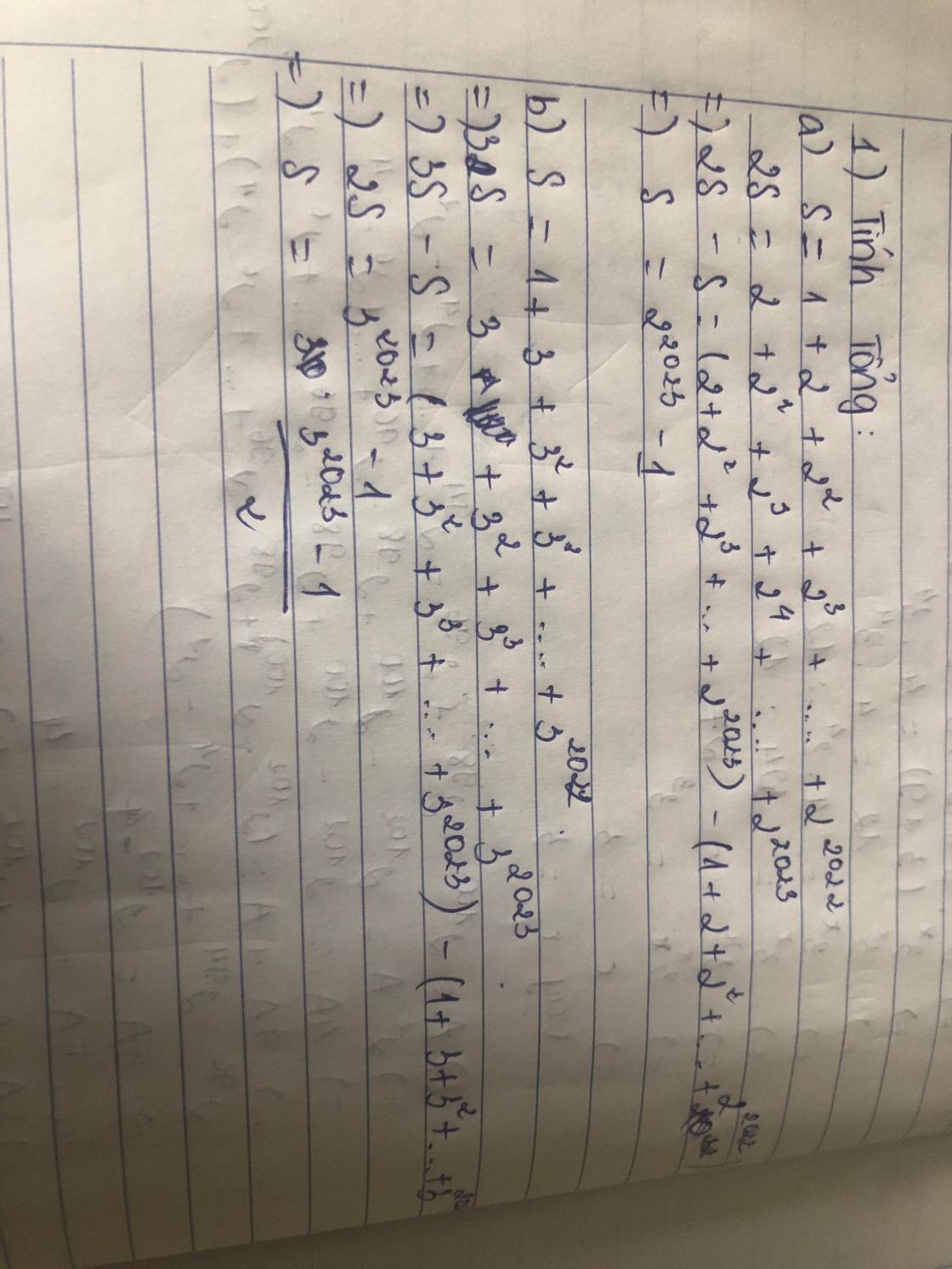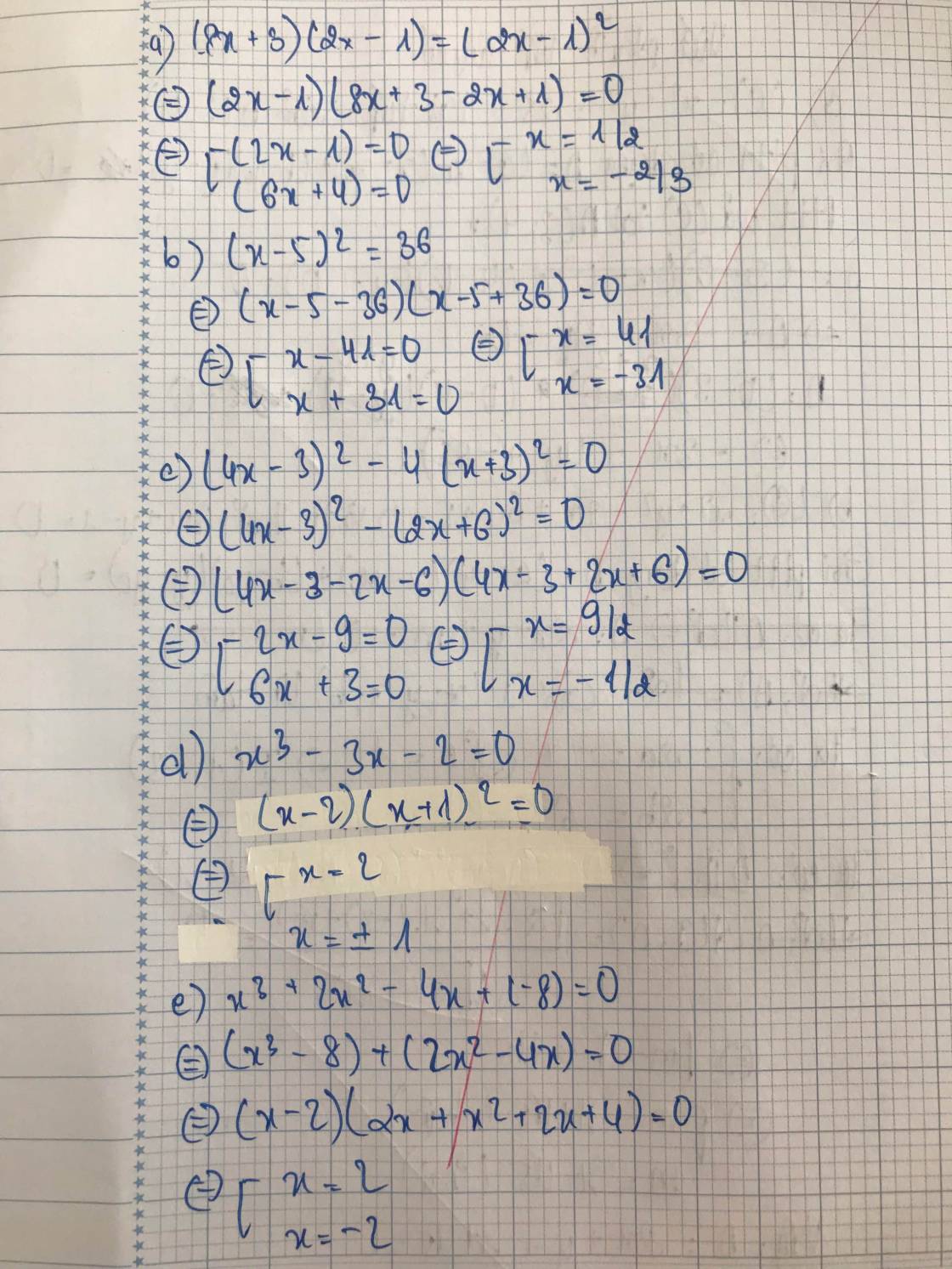Hãy nhập câu hỏi của bạn vào đây, nếu là tài khoản VIP, bạn sẽ được ưu tiên trả lời.


Bạn nên viết đề bằng công thức toán và ghi đầy đủ yêu cầu đề để mọi người hiểu đề của bạn hơn nhé.

5:
a: \(3^{2n}=\left(3^2\right)^n=9^n\)
\(\left(2^{3n}\right)=\left(2^3\right)^n=8^n\)
=>\(3^{2n}>2^{3n}\)
b: \(199^{20}=\left(199^4\right)^5=1568239201^5\)
\(2003^{15}=\left(2003^3\right)^5=8036054027^5\)
mà \(1568239201< 8036054027\)
nên \(199^{20}< 2003^{15}\)
4: \(100< 5^{2x-1}< 5^6\)
mà \(25< 100< 125\)
nên \(125< 5^{2x-1}< 5^6\)
=>3<2x-1<6
=>4<2x<7
=>2<x<7/2
mà x nguyên
nên x=3

5 giờ 4 phút * 6 = 30 giờ 24 phút
4,3 giờ * 4 = 17,2 giờ = 17 giờ 12 phút
3 phút 5 giây * 7 = 21 phút 35 giây
2 giờ 23 phút * 5 = 11 giờ 55 phút
2,5 phút * 6 = 15 phút
CHÚC BN HỌC TỐT!!

5,5 + \(\dfrac{3}{4}\) - 5 + \(\dfrac{1}{4}\)
(5,5 - 5) + (\(\dfrac{3}{4}\) + \(\dfrac{1}{4}\))
= 0,5 + 1
= 1,5
\(\dfrac{5}{2}\) x \(\dfrac{2}{3}\) + \(\dfrac{1}{4}\) : \(\dfrac{3}{2}\)
= \(\dfrac{5}{2}\) x \(\dfrac{2}{3}\) + \(\dfrac{1}{4}\) x \(\dfrac{2}{3}\)
= (\(\dfrac{5}{2}\) + \(\dfrac{1}{4}\)) x \(\dfrac{2}{3}\)
= (\(\dfrac{10}{4}\) + \(\dfrac{1}{4}\)) x \(\dfrac{2}{3}\)
= \(\dfrac{11}{4}\) x \(\dfrac{2}{3}\)
= \(\dfrac{11}{6}\)
Tính \(x\):
435 - [\(x\) + 16] = 425 : 17
435 - [\(x\) + 16] = 25
[\(x\) + 16] = 435 - 25
\(x\) + 16 = 410
\(x\) = 410 - 16
\(x\) = 394

Lời giải:
a.
$A=(x+6)^2-(x+2)^2+2[(x-5)^2-(x-3)^2]$
$=(x+6-x-2)(x+6+x+2)+2[(x-5-x+3)(x-5+x-3)]$
$=4(2x+8)+2(-2)(2x-8)$
$=4(2x+8)-4(2x-8)=4[(2x+8)-(2x-8)]=4.16=64$ không phụ thuộc vào $x$
b.
$B=(x^3-2^3)-(x^3+2^3)=-16$ không phụ thuộc vào $x$
c.
$C=x^4+2x^2-[(x^2+3)^2-(2x)^2]$
$=x^4+2x^2-(x^4+6x^2-4x^2)$
$=x^4+2x^2-(x^4+2x^2)=0$ không phụ thuộc vào $x$
a) Ta có: \(A=\left(x+6\right)^2+2\left(x-5\right)^2-\left(x+2\right)^2-2\left(x-3\right)^2\)
\(=x^2+12x+36+2\left(x^2-10x+25\right)-\left(x^2+4x+4\right)-2\left(x^2-6x+9\right)\)
\(=x^2+12x+36+2x^2-20x+50-x^2-4x-4-2x^2+12x-18\)
\(=34\)
b) Ta có: \(B=\left(x-2\right)\left(x^2+2x+4\right)-\left(x+2\right)\left(x^2-2x+4\right)\)
\(=x^3-8-x^3-8\)
=-16
c) Ta có: \(C=x^4+2x^2-\left(x^2-2x+3\right)\left(x^2+2x+3\right)\)
\(=x^4+2x^2-\left[\left(x^2+3\right)^2-4x^2\right]\)
\(=x^4+2x^2-\left(x^4+6x^2+9\right)+4x^2\)
\(=-9\)

a, \(\Leftrightarrow2x^2=72\)
\(\Leftrightarrow x^2=36\)
\(\Leftrightarrow x=\pm6\)
Vậy ...
\(b,\Leftrightarrow\dfrac{3}{5}x-0,75=2\dfrac{4}{5}.\dfrac{3}{7}=\dfrac{6}{5}\)
\(\Leftrightarrow\dfrac{3}{5}x=\dfrac{6}{5}+0,75=\dfrac{39}{20}\)
\(\Leftrightarrow x=\dfrac{39}{20}:\dfrac{3}{5}=\dfrac{13}{4}\)
Vậy ...
\(c,\Leftrightarrow2x=1\dfrac{5}{6}.\dfrac{6}{11}-\dfrac{3}{10}=\dfrac{7}{10}\)
\(\Leftrightarrow x=\dfrac{7}{10}:2=\dfrac{7}{20}\)
Vậy ...
\(d,\Leftrightarrow\dfrac{1}{x-7\dfrac{1}{3}}=1.5:2\dfrac{1}{4}=\dfrac{2}{3}\)
\(\Leftrightarrow x-7\dfrac{1}{3}=\dfrac{3}{2}\)
\(\Leftrightarrow x=\dfrac{3}{2}+7\dfrac{1}{3}=\dfrac{53}{6}\)
Vậy ...
a) 2x2 - 72 = 0
\(\Rightarrow\) 2x2 = 72
\(\Rightarrow\) x2 = 36 = 62 = (- 6)2
\(\Rightarrow\) x = 6 hoặc x = - 6
Vậy x = 6 hoặc x = - 6
b) (\(\dfrac{3}{5}\)x - 0,75) : \(\dfrac{3}{7}\) = \(2\dfrac{4}{5}\)
\(\Rightarrow\) (\(\dfrac{3}{5}\)x - 0,75) : \(\dfrac{3}{7}\) = \(\dfrac{14}{5}\)
\(\Rightarrow\) \(\dfrac{3}{5}\)x - \(\dfrac{3}{4}\) = \(\dfrac{6}{5}\)
\(\Rightarrow\) \(\dfrac{3}{5}\)x = \(\dfrac{39}{20}\)
\(\Rightarrow\) x = \(\dfrac{13}{4}\)
Vậy x = \(\dfrac{13}{4}\)

a)\(=2\times\left(3h15p+4h20p\right)=2\times7h35p=15h10p\)
b)\(=\dfrac{1}{5}\times\left(24p30s+25p30s\right)=\dfrac{1}{5}\times50p=10p\)


a: \(\dfrac{x+5}{2x^2+3}=\dfrac{5}{2}\)
=>10x^2+15=2x+10
=>10x^2-2x+5=0
Δ=(-2)^2-4*10*5=4-200=-196<0
=>PTVN
b: =>23/6:x=1/4+2/5=5/20+8/20=13/20
=>x=23/6:13/20=23/6*20/13=230/39